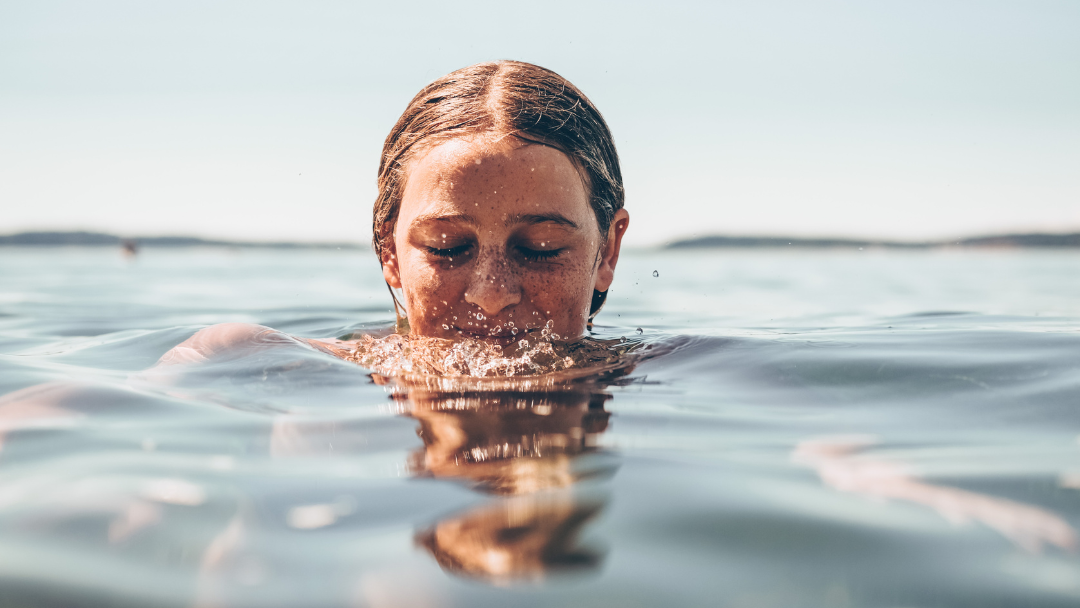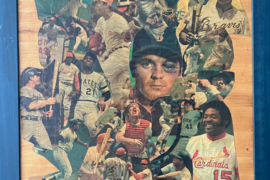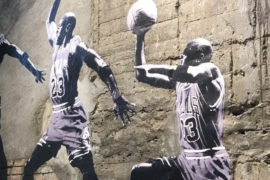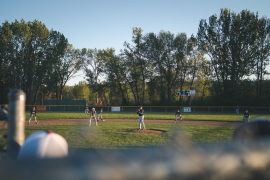I HAVE THIS SACRED RITUAL. Every now and again, I travel to Big Island and visit Pololu Valley, always the morning after I arrive. I’m up at 4AM with jet lag, so I make a cup of coffee, get in the car, and drive north along the Kohala Coast in the dark. Sometimes, hues of blue and orange begin to show themselves in the sky as I approach the valley. If I’m lucky and it’s a clear day, I catch a view of Maui when I look north over the steering wheel.
Pololu lies on the edge of a cliff where the road ends and the water begins. Once I’ve parked, I hike down to the beach. Ignoring posted signs warning of strong currents, I wade in and let the waves crash into my torso. I float for a while, staying close to the shore. Then, I start to swim. With long, slow strokes, I cross the water between the cliffs several times. My heart pounds so hard that I can feel its pulse in my fingertips as they connect with the water.
I have been a swimmer all my life, but the sport I grew up in was never this freeing. Competitive swimming is a brutal business. From an early age, athletes train twice a day. Many leave the sport in college, wanting to lead normal young adult lives. Those who stay often feel like they can’t quit; they’ve invested too much to give it up.
I was one of the latter. And at the end of my swimming career, I was staring at a black line on the bottom of a pool for somewhere around 20 hours a week. I swam until I no longer enjoyed it. When my career ended, I told myself that I would never go in the water again.
Leaving something that took all of your time and energy 一 even if you didn’t love it anymore 一 is never easy. Your soul will hurt and you will feel like you’ve lost a bit of yourself.
I’m ashamed to admit it, mostly because I projected nothing but happy perfectionism during my competitive years, but I counted the days until my last swimming race using a paper calendar on my bedroom wall. To commemorate the finality of it all, I even gave the sport a proper burial. I put all of my trophies in Tupperware containers in my parents’ basement, leaving them to collect dust. My medals from years of racing became donations: to local swim clubs, to friends of mine who coached younger athletes, to charities. “But what about all of your hard work?” my mother asked me, aghast that I didn’t want to keep any of it. For years I had wanted to make my parents proud of my achievements. But now, even when confronted with my mother’s acute disappointment, I couldn’t bring myself to care.
I am now over a decade removed from that life. A life obsessing over Olympic Trials qualifying times and college championships. A life of aching shoulders and fragile mental health. I do not miss it, but I am thankful for the gift of persistence, even if it stole my joy. My time in sport gave me an incredible sense of discipline and resiliency in the face of hardship, and that, too, is a gift.
Ten years ago, I came to Big Island and hiked into Pololu. After descending into the valley, for the first time in a long time, I felt a pull to get into the water. The waves were big and the water rough. It looked intense, scary even, but it captivated me and pulled me in. I waded in until the water reached my thighs, dug my heels into the black sand below me, and gazed north across the open water. I was afraid to swim, but with the fear came a feeling I had not associated with swimming for many years: joy.
I now constantly daydream about the ocean. When I’m in open water, I feel like the best version of myself: strong, aware, and powerful. I love doing something that other people won’t do, either because they are too scared or too intimidated. There is danger in it, and that is what makes me feel most alive. For me, every push and pull of the current is a mirror of the unpredictability of almost everything in life.
Humans can love for a long time—a lifetime, in fact. But we are also programmed to seek out new experiences. The ocean has saved my lifelong relationship with swimming by allowing me to reclaim my place in the water. I am in love again; in love with swimming, in love with the ocean, in love with my body’s capabilities. I no longer swim to achieve anything. I swim for the joy of it.
I often think about how it would feel to rise before the sun and greet the day with a swim in the crashing waves of Pololu every morning. Would it lose its splendor? Maybe. It just might. The rareness of these swims is what makes them so special. Every encounter is unforgettable. And so, I will keep going to Pololu. Not every day, though, and not every week. Just a few times a year, keeping myself away long enough for the pull to return, for it to become unbearable to stay away. That’s when I will drive along the Kohala Coast in the dark to the place where I will greet the new day in the crashing waves of the valley, thankful for the gift of falling back in love.
ALISA VERESHCHAGIN is a linguist and education consultant living in Austin, Texas. She was a 19-time All-American Swimmer and a three-time NCAA champion in the sport of swimming at Kenyon College. In addition writing and swimming, Alisa enjoys learning languages, travel, poetry and running.
Like what you’re reading?
Get new stories, sports musings, or book reviews sent to your inbox. Drop your email below to start >>>
NEW book release
Ghosts Caught on Film by Barrett Bowlin. Order the book of which Dan Chaon says “is a thrilling first collection that marks a beginning for a major talent.”
GET THE BOOK



